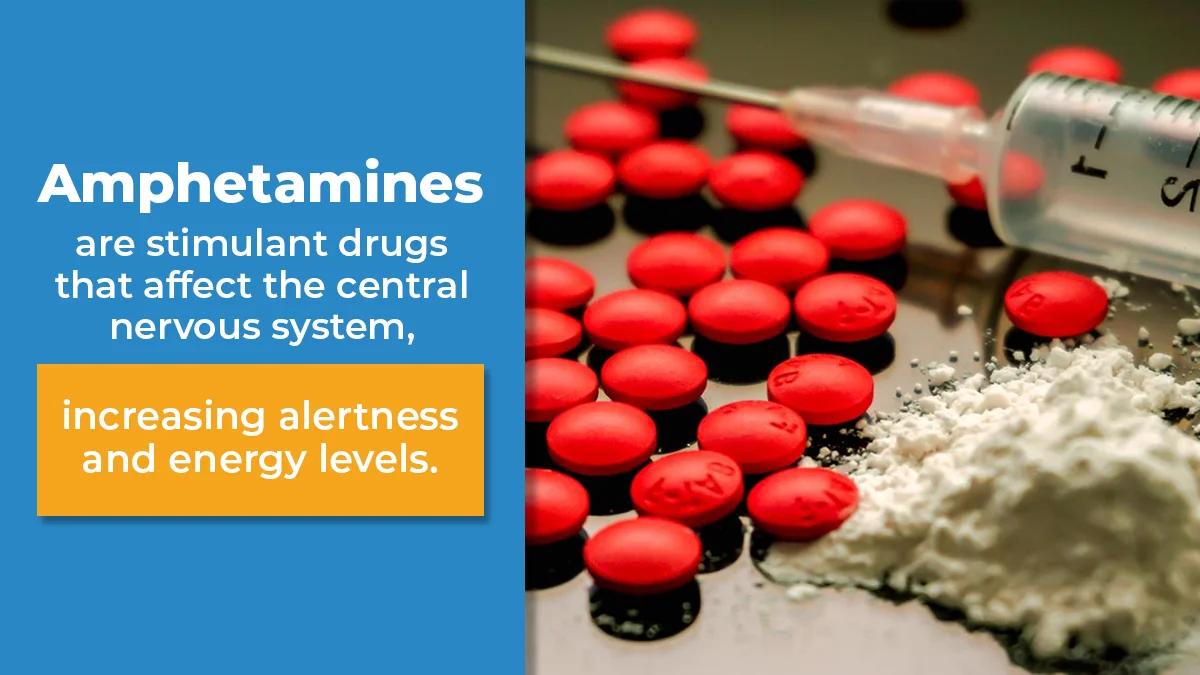Understanding How Amphetamines Work
Amphetamines, a class of powerful stimulant drugs, exert their effects on the central nervous system, offering a surge of energy and heightened alertness. These substances amplify neural signaling by increasing the release and inhibiting the reuptake of neurotransmitters like dopamine and norepinephrine.
This heightened neurotransmitter activity leads to elevated mood, enhanced focus, and increased wakefulness. While amphetamines can be medically prescribed for conditions like attention deficit hyperactivity disorder (ADHD) and narcolepsy, their recreational misuse poses serious health risks.
Understanding the mechanisms behind amphetamine action sheds light on both their therapeutic potential and the dangers associated with misuse.
Key Takeaways
Misuse of amphetamines can lead to addiction, as they have a high potential for abuse. Here’s what you need to know:
- Amphetamines are stimulant drugs that affect the central nervous system, increasing alertness and energy levels.
- They are commonly prescribed for attention deficit hyperactivity disorder (ADHD) but can be abused for their euphoric effects.
- Prolonged use or misuse of amphetamines can lead to addiction, cardiovascular issues, and mental health challenges.
Contact The Recovery Team at (800) 817-1247 for information and medical assistance to embrace long-term healing.
What Are Amphetamines
Amphetamines are a class of central nervous system stimulant drugs that affect neurotransmitters in the brain, particularly dopamine and norepinephrine. They stimulate the central nervous system, increasing alertness, improving focus, and elevating mood.
Amphetamines are commonly prescribed for medical conditions such as attention deficit hyperactivity disorder (ADHD) and narcolepsy. However, they are also consumed recreationally for their euphoric effects. Common street names for amphetamines include “speed” and “uppers.”
Chemistry Makeup
A phenethylamine backbone characterizes the chemical structure of amphetamines. The basic structure consists of a phenyl ring attached to an amino (NH2) group via an ethyl chain. This structure is modified in various ways to produce different amphetamine derivatives with distinct pharmacological properties.
Amphetamines can be formulated in both racemic (containing both enantiomers) and dextroamphetamine (pure d-isomer) forms, each having different effects on the central nervous system.
Synthetic vs Natural
While amphetamines can be found in nature, such as in the ephedra plant, the majority of amphetamines used today are synthetic. Synthetic amphetamines are produced through chemical synthesis in laboratories.
This allows for precise control over the composition and potency of the drug. Natural sources of amphetamines, like ephedra, have been traditionally used in herbal medicine but are less commonly encountered due to the availability of synthetic alternatives.
The synthetic nature of most amphetamines contributes to their consistent and controlled production for medical use and, unfortunately, also facilitates the illegal production of illicit substances.
Types of Amphetamines
Amphetamines can be used for medical purposes, such as treating attention deficit hyperactivity disorder (ADHD) and narcolepsy, or recreationally for their stimulant and euphoric effects.
Here are some common types of amphetamines:
Medicines With Amphetamines
Amphetamine (Adderall): This medication is a combination of amphetamine and dextroamphetamine. It is normally given for ADHD and narcolepsy.
Dextroamphetamine (Dexedrine): This is a pure form of amphetamine and is also used to treat ADHD and narcolepsy.
Lisdexamfetamine (Vyvanse): This is a prodrug of dextroamphetamine, meaning it is absorbed into dextroamphetamine in the body. It is used for the treatment of ADHD.
Methamphetamine (Desoxyn): Although methamphetamine is often associated with illegal recreational use, it is sometimes prescribed for ADHD and obesity under the brand name Desoxyn. However, due to its high abuse potential, it is rarely prescribed.
Recreational Amphetamines
Methamphetamine (Crystal Meth): Methamphetamine is a powerful central nervous system stimulant and is infamous for its illicit use as a recreational drug, often in the form of crystal meth. It can lead to intense euphoria, increased energy, and heightened well-being.
MDMA (Ecstasy/Molly): While MDMA (3,4-methylenedioxymethamphetamine) is not a traditional amphetamine, it shares some pharmacological similarities and is often grouped with amphetamines. MDMA is known for its empathogenic and hallucinogenic effects and is commonly used recreationally in party settings.
How Amphetamines Work on the Nervous System
Amphetamines have stimulant properties and are known for their ability to increase alertness, attention, and energy. Amphetamines, chemical messengers that transmit signals between nerve cells in the brain, influence neurotransmitters’ activity.
The three main neurotransmitters affected by amphetamines are dopamine, norepinephrine, and serotonin.
Dopamine
Dopamine is a neurotransmitter linked with pleasure, reward, and motivation. Amphetamines increase the release of dopamine from nerve terminals into the synapse, the gap between nerve cells. This occurs through several mechanisms:
Enhanced release: Amphetamines promote dopamine release from storage vesicles within nerve cells into the synapse.
Inhibition of reuptake: Amphetamines block the reuptake of dopamine by nerve cells. Normally, after dopamine is released into the synapse, it’s taken back up by the releasing neuron for reuse. Amphetamines interfere with this reuptake process, increasing dopamine concentration in the synapse.
Inhibition of degradation: Amphetamines can also inhibit the breakdown of dopamine, leading to a longer duration of its action in the synapse.
Norepinephrine
Norepinephrine is a neurotransmitter that plays a role in the body’s “fight or flight” response. Like dopamine, amphetamines increase the release of norepinephrine and inhibit its reuptake, leading to increased levels of this neurotransmitter in the synapse.
This contributes to the stimulating effects of amphetamines, including increased heart rate, blood pressure, and alertness.
Serotonin
Serotonin is a neurotransmitter involved in mood regulation, sleep, and appetite. While amphetamines can influence serotonin, their impact on serotonin is less pronounced compared to dopamine and norepinephrine.
Amphetamines may increase serotonin release to some extent, contributing to mood elevation.
Overall Effects
The increased activity of dopamine and norepinephrine in the brain contributes to the stimulant effects of amphetamines. These effects include increased wakefulness, improved focus and attention, elevated mood, and heightened energy.
However, chronic or excessive use of amphetamines can lead to tolerance, dependence, and adverse health effects.
Medical Uses of Amphetamines
Amphetamines affect the central nervous system. While they are commonly associated with recreational use and abuse, they do have legitimate medical uses when prescribed and administered under the supervision of a healthcare professional.
Some medical uses of amphetamines include:
Attention Deficit Hyperactivity Disorder (ADHD)
Amphetamines, such as Adderall (a combination of amphetamine and dextroamphetamine), are commonly prescribed to individuals with ADHD. These medications help improve attention, focus, and impulse control in people with ADHD.
Narcolepsy
Amphetamines may be prescribed to treat narcolepsy, a neurological disorder characterized by excessive daytime sleepiness, sudden episodes of muscle weakness (cataplexy), and disrupted sleep-wake cycles.
Obesity (Off-label use)
In the past, amphetamines were used as appetite suppressants to aid in weight loss. However, their use for this purpose has significantly decreased due to concerns about abuse, addiction, and potential adverse effects.
Depression (Off-label use)
In some cases, healthcare professionals may prescribe amphetamines off-label for treatment-resistant depression. However, this use is not as common in recent years, and the safety and efficacy of this approach are still a matter of debate.
Cognitive Enhancement (Off-label use)
Some studies have explored the use of amphetamines for cognitive enhancement in certain conditions, such as age-related cognitive decline. However, the ethical and safety implications of using stimulants for cognitive enhancement remain controversial.
It’s important to note that the use of amphetamines outside of a medical context can be dangerous and is associated with various health risks, including addiction, cardiovascular problems, and mental health issues. Additionally, the misuse of prescription amphetamines is a serious concern and can lead to severe consequences.
Effects of Amphetamines on the Body
Amphetamines, when misused or abused, amphetamines can have various effects on the body, both in the short term and long term. It’s important to note that using amphetamines without a prescription or in ways not directed by a healthcare professional can be dangerous and lead to serious health consequences.
Here are some of the effects of amphetamines on the body:
Short-term Effects of Amphetamines
- Increased Alertness and Energy: Amphetamines stimulate the central nervous system, leading to heightened alertness and increased energy levels.
- Euphoria: People may experience a sense of euphoria or intense pleasure due to dopamine release in the brain.
- Improved Focus and Concentration: Amphetamines can enhance concentration and focus, making them commonly prescribed for conditions like attention deficit hyperactivity disorder (ADHD).
- Elevated Heart Rate and Blood Pressure: These drugs can cause a temporary increase in heart rate and blood pressure, which may pose risks, especially for young people with cardiovascular issues.
- Suppressed Appetite: Amphetamines often lead to a decreased appetite, which can result in weight loss.
- Dilated Pupils: Pupils may dilate as a physiological response to the stimulant effects.
- Insomnia: Difficulty sleeping is a common short-term side effect, as amphetamines can disrupt normal sleep patterns.
Long-term Effects of Amphetamines
- Tolerance: The body may develop tolerance with prolonged use, requiring higher doses to achieve the same effects.
- Dependence and Addiction: Chronic use can lead to psychological and physical dependence and, in some cases, addiction.
- Cardiovascular Issues: Long-term use may contribute to cardiovascular problems, including hypertension and an increased risk of heart disease.
- Mental Health Issues: Amphetamines can exacerbate or contribute to mental health issues, such as anxiety, paranoia, suicidal thoughts, and depression.
- Cognitive Impairment: Prolonged use may affect cognitive function, including memory and executive functions.
- Malnutrition: Persistent appetite suppression can lead to nutritional deficiencies and malnutrition.
- Dental Problems: Chronic amphetamine use may result in dental issues, often referred to as “meth mouth.”
Severity of Side Effects
The severity of side effects can vary based on factors such as dose, frequency of use, individual tolerance, and pre-existing health conditions. Overdose can lead to more severe complications, including cardiovascular collapse, seizures, and, in extreme cases, death.
It’s crucial for individuals using amphetamines, whether prescribed or consumed recreationally, to be aware of potential risks and seek medical attention if they experience adverse effects. Long-term use of psychostimulant drugs without medical supervision is generally discouraged due to the potential for serious health consequences.
Bid Farewell to Addiction With The Recovery Team
Reclaim your life and triumph over amphetamine dependence with the compassionate support of The Recovery Team.
We understand the challenges of overcoming drug addiction and offer a comprehensive range of evidence-based treatment services tailored to your unique journey. Our residential, intensive outpatient, and transitional living treatment programs provide a continuum of care, ensuring a seamless transition toward lasting recovery.
Furthermore, our Dual Diagnosis Program goes beyond surface-level issues, delving into the root causes of addiction to foster genuine, lasting change.
Your brighter, healthier tomorrow starts here. Contact us at (800) 817-1247 for more information.






